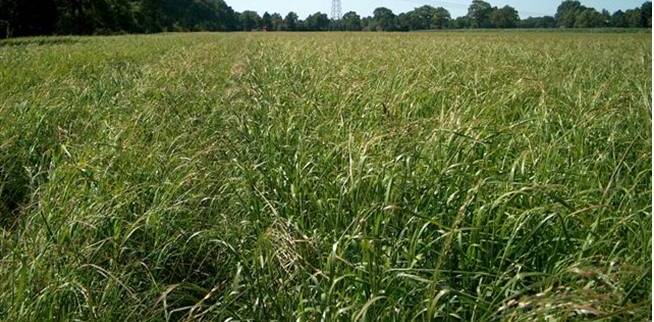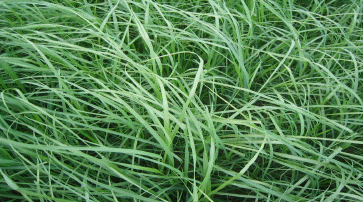| Home Feeding Horses Farm Management | First Posted Nov 15, 2007 Jan 21, 2020 | |
Teff Grass, Lovegrass, Annual Bunch Grass, Warm Season Annual Bunch Grassby Debora Johnson  Target Seed/Excellent Article Update on Teff Grass This year of 2007 has been a draught year as those of us who have to feed horses and other livestock are aware. Hay prices have skyrocketed, that is if you are able to find hay. In Pennsylvania where Timothy has been grown successfully for years there is a new grass on the block. A summer annual grass, Teff Grass, is being planted on a trial basis in PA, to determine if it is a viable forage for horses and other livestock. Teff Grass's origin is Ethiopia, Africa. There it is used as a cereal. Teff Grass is an unusual grass in that it can be harvested and made into hay. Horses can also graze on the grass before it is harvested although the roots are easily pulled out. Most summer grasses cannot be made into hay. I could not find any published research information on the nutritional aspects of Teff Grass as forage relating to livestock performance. There are several experimental sites around the country. Teff Grass is planted later in the season (late May or early June), it needs nitrogen added, and is a warm season grass. It yields about 20% less than conventional feeds. In South Dakota Teff Grass is being marketed as "Dessie Summer Lovegrass" South Dakota Teff Grass Also, in South Dakota, it is documented that the grass got infested by the larvae of a stem-boring wasp, Eurytomocharis eragrostidis. Thirty percent of the grass was infested with this pest in several of the growing locations in late July. Nebraska is also experimenting with Teff Grass. Nebraska Teff Grass In its native Ethiopia, Teff is quite hardy and has few pests. "Domestic experience in teff production is limited; however, teff grain has already found a niche as grain and flour in the health food market. The future of teff forage production for livestock in the United States is unknown. Teff does have the advantage of producing a good hay or pasture crop when late season plantings are required due to a crop failure. Results of a nationwide survey indicate that this crop is virtually unknown in most states, and that production may be limited to only a few western states. Information on teff production in the United States remains scarce as most teff production is handled by private entrepreneurs." Teff Grass Food Crop Oregon State University also did experimental planting with Teff Grass. Teff and Alfalfa. Stay Tuned. The following was sent to me in an e-mail by Ken Rice [krice@alliedseed.com]. I am happy that he visited HorseHints.org and was kind enough to take the time to send me the following update: Versatile Teff Performs Well In Pennsylvania, Specialist Says, Nov 7, 2007 5:40 PM An Ethiopian summer-annual grass called teff could be a valuable asset to Pennsylvania growers, says Marvin Hall, Penn State extension forage specialist. He's optimistic that teff can be grown in the state as successfully as other summer-annual grasses. "I must admit I was skeptical at first," he says. "However, after seeing how well teff performed against other summer annuals in our trials, I have to say that I was pleasantly surprised by the results." The bonus is that it can also be made into hay. "Teff can be used for grazing, taken in as hay or chopped into silage," he says. "This is important because other summer annuals, such as sorghum, cannot be made into hay." Teff can help Pennsylvania farmers avoid some of the pest problems they face with the perennial grass timothy, Hall believes. "We grow a lot of timothy in Pennsylvania, commonly as hay for horses, and it's had a lot of success in the horse-racing market. However, mites recently have been reducing yields by attacking timothy in the spring when it is most productive. I believe that teff, due to its suitability for hay, can serve as a replacement for timothy and can help the timothy producers who are struggling with crop destruction." Although teff grows very rapidly, it can produce slightly smaller yields than other summer annuals, such as sudan and sorghum-sudan. Hall's recent trials, however, have shown that teff yields well in the state. "We grew teff alongside many other summer- annual grasses, including sorghum and a sorghum-sudan hybrid," Hall says. "In trials done at other universities, teff has reached a yield about one-half or two-thirds as large as other summer annuals. However, in our trial, teff reached a yield of 80% of these crops. That is a major difference from some of the past trials and gives us a reason to feel optimistic." It takes a few special management practices to grow teff. Being a warm-season summer annual, it can't be planted until late May or early June. Also, nitrogen inputs are needed to maximize teff yields. Hall hopes that teff can be a unique asset to Keystone State producers. "Teff has been around for a while, but it has not been used much for commercial purposes in the United States," he says. "However, I believe that teff can have a future in Pennsylvania." For More Information: Study: Acceptability of Teff Hay by HorsesStudy Evaluates Horses' Voluntary Consumption of Teff Hay |